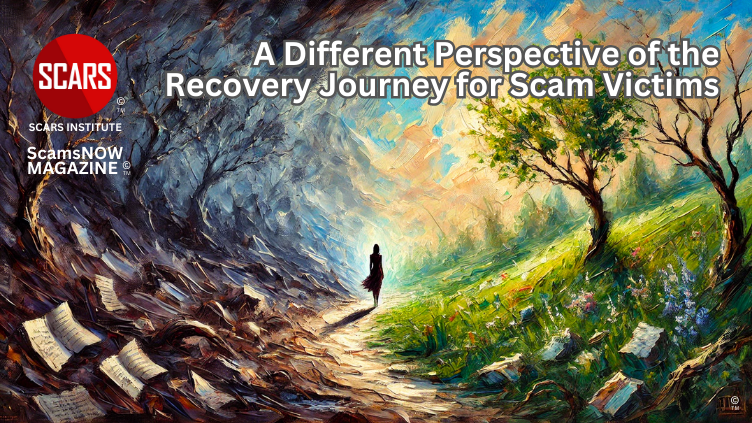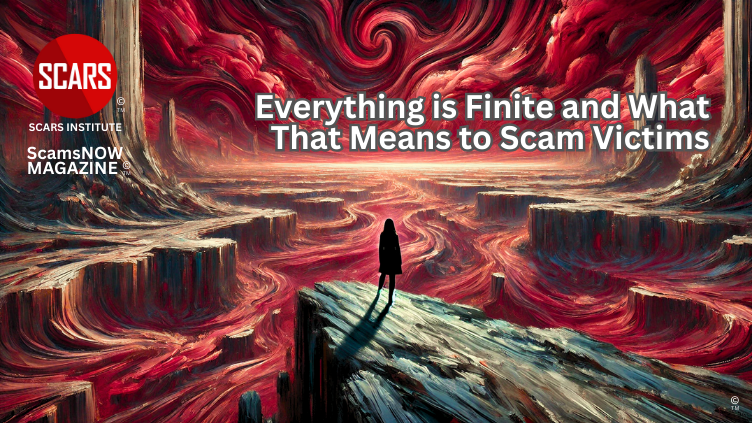Everything is Finite and What That Means to Scam Victims
Finitude and the Scam Victim’s Journey: The End of Illusion, The End of Suffering
Primary Category: Scam Victim Recovery Psychology
Intended Audience: Scam Victims-Survivors / Family & Friends
Authors:
• Vianey Gonzalez B.Sc(Psych) – Licensed Psychologist, Specialty in Crime Victim Trauma Therapy, Neuropsychologist, Certified Deception Professional, Psychology Advisory Panel & Director of the Society of Citizens Against Relationship Scams Inc.
• Tim McGuinness, Ph.D., DFin, MCPO, MAnth – Anthropologist, Scientist, Polymath, Director of the Society of Citizens Against Relationship Scams Inc.
About This Article
Scam victims often seek out survivor stories to find hope—but rarely do they see the hidden reality: most victims, around 75%, do not recover. This article uses the philosophical concept of finitude—the idea that all things have limits—to explain why healing is difficult but entirely possible. The scam may have felt infinite while it was happening, filled with promise and emotional investment, but its end reveals its illusion. That end, though painful, also marks the beginning of truth. The pain that follows feels just as endless, but it too is finite.
True recovery comes not from waiting, but from actively choosing to move through the grief, shame, and betrayal. Finitude teaches that while joy ends, so does suffering—and both become chapters in a larger story. What was real to the victim should be honored, but it should also be placed within boundaries. The victim is no longer trapped in the scammer’s fiction; they are now the author of their own future. Healing is not erasure—it is reintegration. And in learning that nothing lasts forever, survivors find the strength to begin again, grounded in the truth that although everything ends, they do not.

Finitude and the Scam Victim’s Journey: The End of Illusion, The End of Suffering
One of the most disorienting aspects of being the victim of a scam is realizing that what once brought you joy, hope, and connection was never real. It felt real. It lived in you as real. And like all real things, you imagined it would continue. That this love, this opportunity, this friendship, this sense of being chosen—would unfold into a future. But it didn’t. It collapsed. And in its collapse, you were confronted with something that feels unbearable: the end of something you thought would last.
This is the first confrontation with finitude.
Finitude, in philosophical terms, refers to the condition of having limits. Everything human is finite. Our lives, our emotions, our time, our bodies, our relationships—all shaped by a beginning and an end. The scam, no matter how convincing or immersive, was finite. But you didn’t know that while you were inside it. It seemed to stretch forward, full of potential and promise. It was only when it ended that its boundaries became clear.
The realization is painful. You are left asking: How could I have believed in something so false? But belief is not stupidity. It is the human condition. We project meaning into the future. We build stories out of thin air because we must. It’s how we survive. The scam took advantage of this very human tendency and hijacked it. What hurts so deeply is not just that it was fake—it’s that you lived in it as if it were real.
But here is what matters: the illusion was finite.
That false joy, that manufactured closeness, that deceptive relationship—it ended. And the fact that it ended is not just a betrayal. It is also a truth. The truth of its limit. The truth of its non-reality. What you are left with, painful as it is, is not just grief. It is clarity.
Unfortunately, clarity is often the beginning of suffering.
When Joy Ends, Pain Begins
The aftermath of a scam can feel infinite. The betrayal echoes through every thought. The shame replays in every memory. The grief feels like a weight with no bottom. Your mind becomes a loop of questions: Why did I trust? What does this say about me? Can I ever be whole again?
This pain feels like it will never end. But it will. Because pain, too, is finite.
This is the second lesson of finitude: suffering does not go on forever. You are not doomed to relive the betrayal endlessly. It will not always hurt this way. But—and this is important—it will not simply disappear with time. Recovery is not passive. It is active. It is a set of choices you must make, again and again.
When you begin to recover, you are not erasing what happened. You are re-orienting yourself to what is real. You are accepting the boundaries of both joy and pain. You are learning that just as the scam was temporary, so is the wreckage it left behind. You are walking through the debris, not living in it forever.
The Illusion of Infinity: Why the Scam Felt Endless
During the scam, time may have felt suspended. There was always another promise, another delay, another reassurance. The scammer created a narrative of continuity, of inevitability. It was a false future laid out like a path. You were not stupid to believe it. You were human. You wanted something good to be true, and for a while, it was true for you.
This illusion of an unbroken future was part of the manipulation. You weren’t just sold a lie. You were sold a world. And when that world collapsed, you didn’t just lose money or trust. You lost a piece of the self who lived in that world.
But now, you are here. The story ended. And endings, painful though they are, bring you back to the reality of finitude. Nothing lasts forever. Not the joy. Not the betrayal. Not the ache in your chest that keeps you awake at night.
Finitude Is Not Hopelessness
Some victims resist this idea. The notion that everything ends can sound cold. Empty. But finitude is not despair. It is grounding. It means you are not locked in your worst day forever. It means you are not defined by the worst thing that happened to you. You are finite—but also dynamic.
You can change. You can learn. You can rebuild. And those things, too, are finite. They happen step by step, in small and imperfect ways. There is no grand transformation waiting for you. There is only the steady work of healing, one limited act at a time.
You write in your journal. You attend a support group. You set one boundary. You cry. You breathe. You get out of bed. These are not minor acts. They are revolutionary declarations that your pain is finite—and your will to survive is not.
What You Lost Was Real—To You
One of the most damaging things survivors are told—sometimes by others, sometimes by themselves—is to just move on. To stop talking about it. To stop “dwelling.” To forget and let it go as if it were nothing more than a bad dream. But if you gave your heart, your money, your trust—if you planned a future or shared your most vulnerable self—then what happened was not meaningless. The scam may have been built on lies, but your experience of it was genuine. The emotions were real. The hope was real. The loss is real.
This is why it hurts so deeply. You weren’t reacting to fantasy—you were responding to what felt true. You made decisions based on who you believed you were building a life with. You invested emotionally and sometimes financially in something that, to you, existed. It is not a delusion to grieve that. It is human. When people say “but it wasn’t real,” they miss the point entirely. What you felt was real. It came from the most authentic parts of you—your capacity for love, for trust, for connection. That matters. That deserves to be honored, not dismissed.
Finitude, the recognition that all things have limits, does not ask you to erase the past. It asks you to place it in its proper context. To see it not as your whole life, but as one chapter. Accepting that the scam has ended is not the same as pretending it never happened. It’s about recognizing that you are no longer in that story. That you are not bound to repeat its dialogue. That you no longer have to carry the shame or the sorrow, as if the relationship is still alive. It’s not. And that’s what gives you the power to begin again.
You are not a character in the scammer’s fiction anymore. You are the author now. That means you get to write new chapters that are grounded in truth—not someone else’s manipulation. You get to decide who you trust and how. You get to decide what your recovery looks like. You get to reclaim the story of your life from the person who tried to hijack it. That is what finitude gives you: the freedom to acknowledge the ending and then turn the page.
So what you lost was real—to you. That truth is not diminished by the scammer’s deceit. It is a testament to your humanity. But now the story belongs to you. And that means what happens next is entirely yours to shape.
The Pain Will Not Last Forever
There will be a day when you think of the scam, and your breath doesn’t catch in your throat like it used to. A day when the weight in your chest no longer rises every time the memory surfaces. A day when you can say what happened out loud—not without emotion, but without collapse. That day will feel distant for a long time. But it is coming. And when it does, it will not be because the clock moved forward. It will be because you did.
The pain will not vanish because time erased it. It will lose its grip on you because you faced it. Because you chose to feel it without letting it define you. Because instead of avoiding it, you walked through it—unsteady, afraid, but committed to moving forward. That kind of healing is not passive. It is the result of choice after choice, day after day, to keep going even when nothing feels okay.
There will be a day when the shame fades—not because you forgot, but because you understood. You will see the scam for what it was: a crime, not a reflection of your intelligence or your worth. You will stop confusing your trust with failure. You will stop rehearsing the “what ifs.” You will realize that you were never meant to carry this forever. That doing so only keeps you trapped in a moment that was always meant to end.
You will come to understand that the scam, like all things, was finite. It had a beginning and it had an end. The trauma echoed, yes—but echoes fade when you stop returning to the place where the sound began. Part of your healing is learning to stop trying to make something infinite out of something that was never meant to last. You were betrayed. But you are not betrayal. You were hurt. But you are not the hurt. What happened to you was real. But it does not get to live forever unless you keep feeding it.
And so the pain will not last forever—not because time is magical, but because you are. Because inside you is the quiet, resilient truth: that you can outlive what tried to break you. You already are.
What Finitude Teaches You About Strength
The recognition of limits is not a weakness. It is the foundation of resilience. Finitude—the acknowledgment that all things have a beginning and an end—strips away the illusion of permanence and forces you to confront what is real. It teaches you that nothing lasts forever, not even the pain you thought would swallow you whole. And in that realization lies the first flicker of strength.
To know that something ended—whether it was a relationship, a dream, your sense of self, or your trust—and to still choose to live beyond it, that is not denial. That is courage. It is the quiet, persistent decision to keep going, even when nothing feels certain. Finitude gives you that choice. It tells you that even the worst moments are not eternal. That even though your world collapsed, the collapse is not the end of you.
To know that joy can vanish—and still seek joy again—is a form of defiance. It is an act of strength to hope, knowing that hope can be lost. It is brave to love again, knowing you were betrayed. It is wise to rebuild, knowing it could all fall apart again. Finitude reminds you that the fragility of good things does not make them meaningless. It makes them precious.
Recovery does not mean erasing what happened. It means absorbing it into the full shape of your life. It means looking at the wound and saying, “This happened. It changed me. And I am still here.” The pain becomes a chapter—not the title page. The scam becomes a fact—not the definition of who you are.
You are bigger than what was done to you. The crime was real. The violation was real. But it was finite. And you are not. You are still becoming. You are still unfolding. And you get to decide what happens next.
That is what finitude teaches you: everything ends. But not you—not yet.
You Are Still Here
This is the final truth of finitude: despite everything that ended, you did not. Despite what was stolen, broken, or betrayed, you remain. Your breath, your presence, your capacity for meaning—these are not theoretical. They are here. Now.
And they are yours.
The scam was finite.
The pain is finite.
But your potential to heal—that is something you can begin again and again. Not because it is endless, but because it is real.
This is the power of knowing things end: it frees you to start over. Not with the illusion of perfection, but with the honesty of presence.
Not because nothing matters.
But because this does.
-/ 30 /-
What do you think about this?
Please share your thoughts in a comment below!
Statement About Victim Blaming
SCARS Institute articles examine different aspects of the scam victim experience, as well as those who may have been secondary victims. This work focuses on understanding victimization through the science of victimology, including common psychological and behavioral responses. The purpose is to help victims and survivors understand why these crimes occurred, reduce shame and self-blame, strengthen recovery programs and victim opportunities, and lower the risk of future victimization.
At times, these discussions may sound uncomfortable, overwhelming, or may be mistaken for blame. They are not. Scam victims are never blamed. Our goal is to explain the mechanisms of deception and the human responses that scammers exploit, and the processes that occur after the scam ends, so victims can better understand what happened to them and why it felt convincing at the time, and what the path looks like going forward.
Articles that address the psychology, neurology, physiology, and other characteristics of scams and the victim experience recognize that all people share cognitive and emotional traits that can be manipulated under the right conditions. These characteristics are not flaws. They are normal human functions that criminals deliberately exploit. Victims typically have little awareness of these mechanisms while a scam is unfolding and a very limited ability to control them. Awareness often comes only after the harm has occurred.
By explaining these processes, these articles help victims make sense of their experiences, understand common post-scam reactions, and identify ways to protect themselves moving forward. This knowledge supports recovery by replacing confusion and self-blame with clarity, context, and self-compassion.
Additional educational material on these topics is available at ScamPsychology.org – ScamsNOW.com and other SCARS Institute websites.
-/ 30 /-
What do you think about this?
Please share your thoughts in a comment below!
Important Information for New Scam Victims
- Please visit www.ScamVictimsSupport.org – a SCARS Website for New Scam Victims & Sextortion Victims.
- SCARS Institute now offers its free, safe, and private Scam Survivor’s Support Community at www.SCARScommunity.org – this is not on a social media platform, it is our own safe & secure platform created by the SCARS Institute especially for scam victims & survivors.
- SCARS Institute now offers a free recovery learning program at www.SCARSeducation.org.
- Please visit www.ScamPsychology.org – to more fully understand the psychological concepts involved in scams and scam victim recovery.
If you are looking for local trauma counselors, please visit counseling.AgainstScams.org
If you need to speak with someone now, you can dial 988 or find phone numbers for crisis hotlines all around the world here: www.opencounseling.com/suicide-hotlines
Statement About Victim Blaming
Some of our articles discuss various aspects of victims. This is both about better understanding victims (the science of victimology) and their behaviors and psychology. This helps us to educate victims/survivors about why these crimes happened and not to blame themselves, better develop recovery programs, and help victims avoid scams in the future. At times, this may sound like blaming the victim, but it does not blame scam victims; we are simply explaining the hows and whys of the experience victims have.
These articles, about the Psychology of Scams or Victim Psychology – meaning that all humans have psychological or cognitive characteristics in common that can either be exploited or work against us – help us all to understand the unique challenges victims face before, during, and after scams, fraud, or cybercrimes. These sometimes talk about some of the vulnerabilities the scammers exploit. Victims rarely have control of them or are even aware of them, until something like a scam happens, and then they can learn how their mind works and how to overcome these mechanisms.
Articles like these help victims and others understand these processes and how to help prevent them from being exploited again or to help them recover more easily by understanding their post-scam behaviors. Learn more about the Psychology of Scams at www.ScamPsychology.org
SCARS INSTITUTE RESOURCES:
If You Have Been Victimized By A Scam Or Cybercrime
♦ If you are a victim of scams, go to www.ScamVictimsSupport.org for real knowledge and help
♦ SCARS Institute now offers its free, safe, and private Scam Survivor’s Support Community at www.SCARScommunity.org/register – this is not on a social media platform, it is our own safe & secure platform created by the SCARS Institute especially for scam victims & survivors.
♦ Enroll in SCARS Scam Survivor’s School now at www.SCARSeducation.org
♦ To report criminals, visit https://reporting.AgainstScams.org – we will NEVER give your data to money recovery companies like some do!
♦ Follow us and find our podcasts, webinars, and helpful videos on YouTube: https://www.youtube.com/@RomancescamsNowcom
♦ Learn about the Psychology of Scams at www.ScamPsychology.org
♦ Dig deeper into the reality of scams, fraud, and cybercrime at www.ScamsNOW.com and www.RomanceScamsNOW.com
♦ Scam Survivor’s Stories: www.ScamSurvivorStories.org
♦ For Scam Victim Advocates visit www.ScamVictimsAdvocates.org
♦ See more scammer photos on www.ScammerPhotos.com
You can also find the SCARS Institute’s knowledge and information on Facebook, Instagram, X, LinkedIn, and TruthSocial
Psychology Disclaimer:
All articles about psychology and the human brain on this website are for information & education only
The information provided in this and other SCARS articles are intended for educational and self-help purposes only and should not be construed as a substitute for professional therapy or counseling.
Note about Mindfulness: Mindfulness practices have the potential to create psychological distress for some individuals. Please consult a mental health professional or experienced meditation instructor for guidance should you encounter difficulties.
While any self-help techniques outlined herein may be beneficial for scam victims seeking to recover from their experience and move towards recovery, it is important to consult with a qualified mental health professional before initiating any course of action. Each individual’s experience and needs are unique, and what works for one person may not be suitable for another.
Additionally, any approach may not be appropriate for individuals with certain pre-existing mental health conditions or trauma histories. It is advisable to seek guidance from a licensed therapist or counselor who can provide personalized support, guidance, and treatment tailored to your specific needs.
If you are experiencing significant distress or emotional difficulties related to a scam or other traumatic event, please consult your doctor or mental health provider for appropriate care and support.
Also read our SCARS Institute Statement about Professional Care for Scam Victims – click here
If you are in crisis, feeling desperate, or in despair, please call 988 or your local crisis hotline – international numbers here.
More ScamsNOW.com Articles
A Question of Trust
At the SCARS Institute, we invite you to do your own research on the topics we speak about and publish. Our team investigates the subject being discussed, especially when it comes to understanding the scam victims-survivors’ experience. You can do Google searches, but in many cases, you will have to wade through scientific papers and studies. However, remember that biases and perspectives matter and influence the outcome. Regardless, we encourage you to explore these topics as thoroughly as you can for your own awareness.















![NavyLogo@4x-81[1] Everything is Finite and What That Means to Scam Victims - 2025](https://scamsnow.com/wp-content/uploads/2025/04/NavyLogo@4x-811.png)










![scars-institute[1] Everything is Finite and What That Means to Scam Victims - 2025](https://scamsnow.com/wp-content/uploads/2025/04/scars-institute1.png)

![niprc1.png1_-150×1501-1[1] Everything is Finite and What That Means to Scam Victims - 2025](https://scamsnow.com/wp-content/uploads/2025/04/niprc1.png1_-150x1501-11.webp)